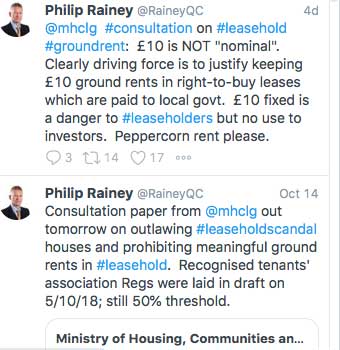
Solicitor Mari Knowles and barrister Justin Bates have offered their services pro bono to leaseholder Michelle Baharier who is fighting a £24,000 Upper Tribunal case against a QC.
The lawyers, who are both working on the leasehold reform agenda at the Law Commission, stepped in after reading the case on the LKP website today.
Michelle Baharier, who bought her flat as a right-to-buy, won her case as a litigant in person after Southwark Council spent out £1 million to enhance the heating system at the Gilesmead site in Camberwell.
Mari Knowles, who has repeatedly advised leaseholders and often for free over doubling ground rent and conveyancing professional negligence, told LKP:
“I am motivated by the sheer injustice involved in this. A litigant-in-person leaseholder should not be fighting an appeal against a QC in the Upper Tribunal.”
The involvement of Justin Bates will confuse leaseholders: he has previously been reviled for fighting against right to manage applications from some of the leasehold sector’s least savoury freeholders.
Housing staff at Southwark Council failed to persuade the First Tier Tribunal that Miss Baharier should pay up.
It has now decided to deploy the services of Philip Rainey QC, one of the leading figures in landlord and tenant law.
If Miss Baharier loses the case, she will very likely face devastating legal costs awarded against her.
This reduces the justice of her case to a high risk game of roulette.
In a further irony, Mr Rainey has spoken several times at LKP events urging the case to reform leasehold laws.
Philip Rainey QC: Are we creating homes or an investment asset class?
 He has also indicated his strong support to set new ground rents to zero, disagreeing with the government’s “nominal” £10 a year proposal which maintains speculators’ income streams in ordinary families’ homes.
He has also indicated his strong support to set new ground rents to zero, disagreeing with the government’s “nominal” £10 a year proposal which maintains speculators’ income streams in ordinary families’ homes.
LKP has urged Southwark to mediate the issue, in correspondence copied to local MP Harriet Harman, the Communities Secretary James Brokenshire and the MP patrons of LKP, who are also the chairs of the APPG.
We wholeheartedly applaud Mari Knowles and Justin Bates for offering their services to assist Miss Baharier.





 Anger at Law Commission meetings in offices of freeholders’ solicitors
Anger at Law Commission meetings in offices of freeholders’ solicitors






















Justin Bates and Mari Knowles have offered to Pro Bono a client Michelle Baharier, who purchased the leasehold on a flat as a right-to-buy, won her case as a litigant where Southwark Council spent £1 million to enhance a heating system at the Gilesmead site in Camberwell.
Is this the same Justin Bates who has been previously condemned by LKP for representing (Westbury Residential) in an RTM case – Wharfside Point South where LKP have continually praised Phillip Rainey QC.
Whereas Mari Knowles, repeatedly advised leaseholders, often for free over doubling ground rent and conveyancing professional negligence. Mari told LKP – I am motivated by the sheer injustice involved in this. A litigant-in-person leaseholder should not be fighting an appeal against a QC in the Upper Tribunal.
The involvement of Justin Bates is confusing as he has previously been reviled for fighting against right to manage applications from some of the leasehold sector’s least savoury freeholders.
In a further irony, Mr Rainey had spoken many times at LKP events urging the case to reform leasehold laws.
Is it gamekeeper turned poacher or poacher turned gamekeeper, which ever it is I feel the comment made “A litigant-in-person leaseholder should not be fighting an appeal against a QC in the Upper Tribunal” is just and this should apply to the FTT as well. I do not personally condemn the change as above, I think highlighting this unusual happening, shows further confusion in the legal that is Leasehold.
I think it is off target berating barristers simply for being good at their brief.
I had to ‘fight’ one as an applicant (i.e. not respondent) at the old LVT and almost lost my shirt. I felt pleased to see his shock when I held out my hand to shake his at the end. Always hold the high ground, I say. Good place to be buried.
This development offers hope for the lessee.
Word of caution, mind.
The FTT here also found (para 49) that, had the works not been disqualified as improvements, the £24,500 bill per flat would be reasonable. Para 49 suggests (at least to me) that leaseholders didn’t submit any “like-for-like” alternative quotations?
Also, Para 50 seems to contradict para 20 (the bit which mentioned consulting on individual boilers). Para 50 seems to say the LL consulted only on the option it intended to pursue?
Sounds to me like the consultation merely offered the chance to submit observations and alternative quotes for a communal system? What if any lessee didn’t want a communal system in favour of an individual modern boiler system?
How can £24,500 ever be reasonable for a heating system in a 2 bed flat? As against what?
To me cases like this scream out the need for meaningful leasehold reform.
Being consulted on major works is (as a matter of semantics) only slightly better than being informed, but nowhere near as protective a right as to negotiating prior to any binding action and cost.
In the end it all matters not, because a landlord has no obligation to do more than issue a notice of intent along with a broad estimate and some vague wording, then ‘consider’ responses received and carry on as originally planned.
S20 regs are a “means to an end, not an end in themselves, and the end to which they are directed is the protection of tenants in relation to service charges” (Daejan Investments v Benson [2013] UKSC 14, [2013] 1 WLR 854, Supreme Court).
Protect tenants in relation to what, exactly?
Always a reason for every action.
Could Mr Bates altruism on behalf of the leaseholder be in any way connected with the closure of Arden Chambers after being taken over by Grays Inn?
Michael,
Shame on you, Mr Bates clearly has had his Damascus moment and repented. -There are none more righteous than a sinner who has seen the light.
I would like to say an amazingly big “thank you” to LKP staff for their fantastic relationships with these truly admirable legal professionals, Justin & Mari, who have agreed to support our fellow leaseholder, Michelle!!
Somewhat off-topic but relevant. Tracey Crouch has resigned her ministerial role over government decision to put back the start date of ban on “crack cocaine” fixed odds betting terminals – Tracey Crouch is to be commended and joins Crispin Blunt in the not so nasty Tory group of MP’s.
Why relevant (need you ask?). Because we have the very same thing going on with these “crack cocaine” terminals as we have with leasehold. Elite groups of people are profiting at the expense of ordinary people, and doing so with the acquiescence (and acquiescence is understating it) of government.
Forgive me fellow leaseholders, there are even greater social evils alive and well and thriving in modern day UK, and “crack cocaine” terminals are one of them. Fight the fight to rid this country of leasehold, it is a most worthy fight to fight, and win. But do not then go to sleep.
My turn to go somewhat off- topic? Aaron Banks is currently being investigated over donations to the Leave Campaign in the referendum..
One area of suggested concern is the potential lack of transparency of several entities that are based offshore and the possibility of Russian donations.
I make no accusation whatsoever of any wrong doing..
But i do find it a little intriguing that the use of offshore companies is deemed worthy of further investigation . in the case of Aaron Banks , but is deemed to be perfectly acceptable in the case of freeholders..
You are welcome to go off topic, because these points are not that off topic.
Like leasehold, they concern the way we are badly being governed. Gambling has always been regulated (and should be off the TV) and generations of politicians knew this once.
As for offshore ownership, it is difficult to see how a democracy can function with so much property being owned by hidden beneficiaries. It is worse in this country than anywhere else.
Why?
In 1086 (I believe it was a Tuesday afternoon?) William the Conqueror (Bill to his mates) ordered a “Great Survey” to be carried out which was later named the Doomsday Book.
His reasoning was that he could not govern a nation properly unless he knew what assets it had and more importantly he needed to know who held those assets.
What was appropriate for 1086 is surely even more appropriate for 2018?